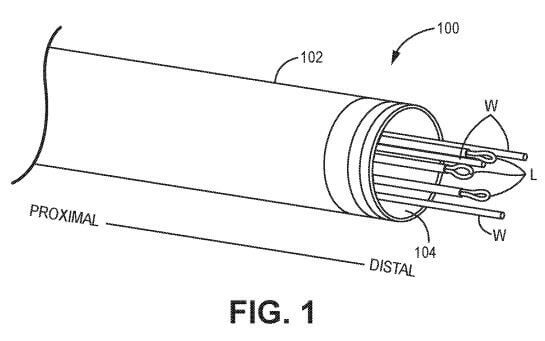USPTO Issues 11 Millionth Patent
Takeaway: U.S. Patent and Trademark Office reaches new milestone in American innovation and ingenuity.

On May 11, 2021, the USPTO issued U.S. Patent No. 11,000,000. This impressive landmark comes just three years after the USPTO issued patent number 10,000,000 in March of 2018.
The U.S.’s 11 millionth patent is one of a family of inventions granted to Saravana Kumar and Jason Diedering of 4C Medical Tech.
This utility patent “provides methods, devices and systems for delivering, positioning, and/or repositioning an expandable prosthetic heart valve in a patient’s heart chamber.”
As a short background to the U.S. Patent system, the first numbered patent was granted to Senator John Ruggles on July 13, 1836, after the creation of the Patent Act of 1836, for a traction wheel for steam locomotives.
Prior to this Patent Act, patents were only identifiable by inventor and issue date. Sadly, a few months after the Patent Act of 1836 was enacted, a catastrophic fire at the Patent Office destroyed almost all of the records and models related to patents issued prior to the Act.
Rubik’s Cube’s Causes Confusion in Court

Takeaway: It is important to be specific in designating what elements you claim to be your trade dress in order to protect against infringement.
Recently, a Southern District of New York court decided on a case involving the iconic Rubik’s Cube. The case was premised on a lookalike Rubik’s cube with a white grid and rounded corners on the individual cubes.
The Magistrate Judge rejected the defendant’s argument that the black grid and colored squares of the Rubik’s Cube in combination were functional and not worthy of trade dress protection. The Court was not persuaded that the coordinated color scheme of the Rubik’s Cube were essential to the purpose of solving the puzzle, and thus, was not functional.
The Court, however, noted that the question of whether the defendant’s white grid cube infringed the classic black cube and would have to go to a jury. The decision from a jury may be delayed by the likely objection by the defendant to the Magistrate Judge’s Report and Recommendation on the issue of whether the defendant committed trademark infringement.
It appears that the plaintiff in the case was fairly specific in designating what elements it claimed to be its trade dress, which is a wise thing to do in a trade dress infringement case.
The USPTO Urges the Federal Circuit to Reject a First Amendment Challenge to the Lanham Act
Takeaway: The USPTO is of the position that real name trademarks should not qualify for trademark registration.
The USPTO asked that the appeals court for the Federal Circuit uphold a provision barring registration of any trademark that identifies a “particular living individual.” This rule was used just last year to deny registration of the phrase “Trump Too Small.”
The applicant who applied to register the mark, referencing former President Donald Trump, argued that the rejection violated the First Amendment. The USPTO, however, stated that this case “involves a targeted effort to preclude federal registration that facilitates a particular type of commercial behavior that has already been banned by most states: appropriating another person’s name to market a product without consent and thus infringing on the right to publicity and the right to privacy,” and thus is not available for registration.
The United States Supports an IP Waiver for the COVID-19 Vaccine
Takeaway: Any outcome for negotiations with WIPO regarding a COVID-19 vaccine waiver may be a long ways away.

The Biden administration currently has backed a temporary waiver on intellectual property for COVID-19 vaccines, but there may be negotiation issues with the World Trade Organization about any deal secured. Some countries like India and South Africa argue that allowing intellectual property rights will make the vaccine harder to obtain. Additionally, the European Union is open to discussion of a waiver, while Germany opposes the United States’ position.
The first step in resolving this dilemma will be to open up negotiations to find common ground regarding how long the waiver should last, if it will be available for distribution for poorer nations, and how to protect the technological trade secrets used in creating the vaccine. It may be a long and difficult road ahead before any deal is finalized.
Photo Credit: www.dw.com/en/us-announces-support-for-covid-vaccine-intellectual-property-waiver/a-57440500
Cybersecurity and the Colonial Pipeline
Takeaway: Proactive cybersecurity measures are necessary and can protect any company, big or small, from possible phishing or ransomware attacks.
Earlier this month, the Colonial Pipeline made headlines when hackers infiltrated the largest and most critical national refined oil infrastructure in the U.S., cutting the flow of oil on domestic soil.
As more details continue to surface, cyber expert Jon Niccolls from CheckPoint, weighing in on what may have been the source, stated, “Some of the biggest attacks we’ve seen all started with an email.” What Mr. Niccolls is referring to is commonly known as phishing—a popular tactic used by hackers sending fraudulent emails to email users that encourage them to click on links or attachments containing malware and/or to enter personal information, such as a credit card number, social security number, or password.
Following the attack, President Joe Biden signed an Executive Order aimed at improving the nation’s cybersecurity in an effort to protect the public and private sectors.
What lessons can small to mid-sized businesses take away from these events? We cannot stress enough the importance of staying ahead of the game. As hackers become more sophisticated, it is crucial to adopt security measures. It is not only a recommendation to save money in the long-run, but may also be your legal duty to adopt certain measures. Contact us today to learn which security measures you should be taking to protect your business.
Cislo & Thomas LLP Spotlight
Mark D. Nielsen, Ph.D., Esq. | Highly-Skilled IP Litigator

As written on the statue of Tommy Trojan at his alma mater, USC, Mark is a “faithful, scholarly, skillful, courageous, and ambitious” intellectual property/patent litigator.
As a partner at Cislo & Thomas LLP for 15 years, Mark’s high-level, tireless intellectual property litigation efforts have advanced the interests of many Cislo & Thomas clients. Mark is a superior brief writer and uses his skills to secure favorable decisions for clients.
Mark has litigated in federal courts throughout the U.S., including in California, Washington, Colorado, Texas, Florida, Virginia, Michigan, Minnesota, Illinois, New Jersey, New York, Delaware, and elsewhere.
Mark has also had several opportunities to appear before the United States Court of Appeals for the Federal Circuit. In fact, it is believed that Mark argued the first post-KSR obviousness appeal in the Federal Circuit in early May of 2007, which he won.
When Mark isn’t zealously advancing his clients’ interests, he is likely golfing, fishing, or traveling with his wife, Maria.
Check out Mark’s weekly intellectual property takeaways on our firm blog or LinkedIn Page to stay updated on current events and decisions in the world of all things intellectual property.
Katherine Sales, Esq. at Solo and Small Firm Summit 2021
On June 24th, Cislo & Thomas LLP Attorney Katherine Sales will be on a panel for “E-Commerce Start Up Legal Issues: A Case Study” at the Solo and Small Firm Summit 2021. This panel will discuss obtaining the necessary intellectual property, choosing an entity form, how to bring in investors and incentivize employees, and other issues of business-start ups. This virtual event will be worth 1 MCLE credit and costs $120. Sign up for the virtual panel HERE.
Enjoy keeping up with IP news?




